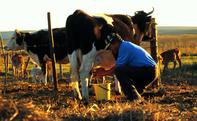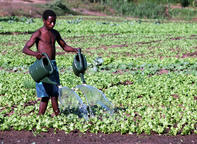A Hostile Environment
Most of South Africa’s food goes through the hands of large-scale commercial interests. We have as few as 40 000 big farmers who account for a third of our gross farming income, while ten agri-businesses supply 85% of our produce.

These figures differ for other southern African countries where small-scale farmers and the informal sector play a much bigger role. With that much of our food coming from such a small number of operators, there does need to be some kind of a national agenda that fosters and protects the big operators. Farmers are working in a pretty hostile environment, both environmentally and politically.
The number of commercial farmers has shrunk drastically in the past decade and a half. In 1996, there were 61 000 big farmers out there. Today there are just fewer than 40 000. One of the most likely reasons behind this exodus from the land is the instability associated with land reform policy and land restitution.
Which farmer is going to invest millions in developing his property (commercial farming is still mostly a male-dominated world) when there is the chance that he will be bought out through the land claims process before he has seen a return on the investment?
Overly Politicised Land Issues
You will be hard-pressed to get a government official or an organisation such as Agri SA to put the issue of land reform on record because the issue is far too politicised now.
Apartheid and pre-apartheid land policy left much of the prime commercial farmland in the hands of white farmers, and the issue of unequal access to land has been taken up by former African National Congress (ANC) Youth League president Julius Malema, who has used a contentious call for nationalisation of land to further his public profile.
There is a feeling that because of the overly politicised nature of land issues now, commercial and even emerging farmers have been left without the kind of political support they need.
No one wants to touch the issue. So there is a handful of important operators at the top of the farming pyramid. At the bottom of the pyramid there are between 1 and 2 million subsistence farmers who grow much of their own food in home gardens and on small plots.
But wedged in between these two extremes – the two ends of the system of duality in the South African farming sector that reflects the same kind of ‘two economies’ that Thabo Mbeki spoke about during his presidency – is a group of important but underutilised farmers.
Emerging Farmers Find it Difficult to Survive

These are the smaller-scale farmers, the so-called emerging farmers – many of whom get annoyed at the term because at some point they need to be seen as ‘emerged’ and treated as viable commercial operators, even if they are small scale – who also need to be harnessed up to become important contributors to the national pool of available food.
Speaking at a breakfast forum hosted by the Southern African Food Lab in Cape Town in June 2011, Professor Andries Du Toit from the Programme for Land Reform and Agrarian Studies at the University of the Western Cape pointed out that there are between 100 000 and 150 000 small farmers who want to get their produce to the markets but cannot secure themselves into the food value chain.
They need better infrastructure in their communities so they can deal with the practicalities of getting their produce into the food-flow systems, which carry edible commodities from the farm to the market. And then they need the retail side of the food value chain to allow them in, too. Many of the larger chains strike deals with farmers that shift the risk onto the farmer, require stringent targets in terms of delivering produce, and push down the prices and make it tougher to survive as a farmer.
Large retailers play a role in this, since the strength of their purchasing power pushes down the price of farming produce and shifts the risk back onto the supplier, often making it increasingly difficult to survive as a farmer. If they cannot make it as small commercial ventures, these farmers, who together represent a million individual livelihoods, are likely to become part of the problem of the growing urban poor.
Joining the Urban Unemployed
With no way of surviving in the countryside, farmers and their dependents head into the cities in the hope of finding some other way of making a living, only to find themselves trying to get soaked up by an urban economy that cannot absorb the steady trickle of urbanising, unskilled people.
Around the world, this trend of ‘jobless de-agrarianisation’ – leaving a faltering livelihood as a small farmer, and heading towards the city with no job waiting on the other side for them – is driving what has been called the ‘planet of the slums’.
The pressure on farmers to survive in the midst of depleting soils, extreme weather events, volatile global markets and oil prices, and even land grabs in many parts of Africa is driving them off the land (for instance, China is securing access to vast farmland, and associated water rights, in order to grow food here to ship back to feed its swelling population at home).
If we do not find a way to link these small commercial farmers into the food value chain, they are likely to join the steady flow of people heading towards the cities who so often end up unemployed and forced to settle in the spreading urban slums.
We need to explore alternative value chains for small commercial farmers, given the lack of successful models and extension services that support the integration of farmers into the existing mainstream “supermarket model”.
By Leonie Joubert